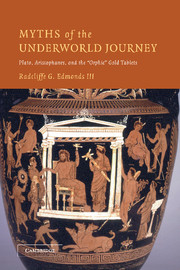Book contents
- Frontmatter
- Contents
- Preface
- 1 Introduction: The Start of the Journey
- 2 Roadmaps of Déviance: The ‘Orphic’ Gold Tablets
- 3 Descent to the Depths of Comedy: The Frogs of Aristophanes
- 4 The Upward Path of Philosophy: The Myth in Plato's Phaedo
- 5 Conclusions: The End of the Road
- Bibliography
- Index Locorum
- Index
3 - Descent to the Depths of Comedy: The Frogs of Aristophanes
Published online by Cambridge University Press: 13 October 2009
- Frontmatter
- Contents
- Preface
- 1 Introduction: The Start of the Journey
- 2 Roadmaps of Déviance: The ‘Orphic’ Gold Tablets
- 3 Descent to the Depths of Comedy: The Frogs of Aristophanes
- 4 The Upward Path of Philosophy: The Myth in Plato's Phaedo
- 5 Conclusions: The End of the Road
- Bibliography
- Index Locorum
- Index
Summary
INTRODUCTION
τίς δ' ōδεν εἰ τò ζν έν ἐστι κατθανεĩν, τò κατθανεĩν δέ ζν;
“Who knows if life be death or death life?”
The spring of 405 BCE was a time of uncertainty for Athens as it tottered on the brink of destruction. Aristophanes produced the Frogs at the Lenaia festival in competition with the Muses of Phrynichos and the Kleophon of Platon Comicus, roughly six months after the naval battle of Arginousai, the Athenians' last major victory in the Peloponnesian War, and six months before the fateful battle of Aigospotamai, where Athens lost its fleet to the Spartan forces. Not only did the Frogs take first prize in this contest, but the play also received the unprecedented honor of a second performance, probably in 404. This exceptional play, performed at a crucial time in the history of Athens, is also the longest telling of a katabasis myth extant from the classical period and earlier. Although many myths of this type were told in many different genres, no complete telling of a journey to the underworld survives between the Nekyia in Homer's Odyssey and the myths of Plato. While only allusions and fragments of this tradition remain to us, it was quite familiar to Aristophanes' audience in 405, and, in this comedy, Aristophanes plays with the traditional elements of this kind of story, humorously distorting well-known motifs.
In contrast to the simple and fragmentary narratives of the gold tablets, the narrative of a journey to the underworld in Aristophanes' Frogs is not only complete but complex.
- Type
- Chapter
- Information
- Myths of the Underworld JourneyPlato, Aristophanes, and the 'Orphic' Gold Tablets, pp. 111 - 158Publisher: Cambridge University PressPrint publication year: 2004



